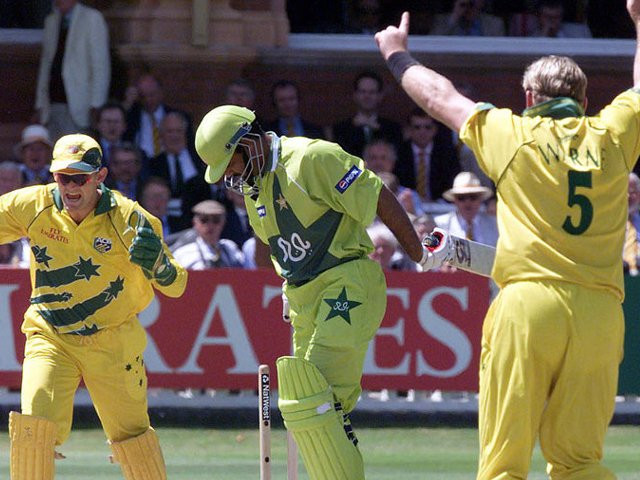
Steve Waugh’s Australia were neck deep in trouble after losing to New Zealand and Pakistan; one more loss would have ended their campaign at the group stages. In a must win game, the West Indies bore the brunt of renewed Australian vigour and the Kangaroos secured the last spot in the Super Six stages by the skin of their teeth.
After overpowering India and Zimbabwe, Steve Waugh’s men braced for a titanic clash against Hansie Cronje’s green machine at Headingley. Once again defeat was not an option but alarm bells started ringing after an assured century by Herschelle Gibbs took the Proteas to 271.
Australia were pegged back by the loss of three early wickets for just 48, and the 1987 champions were staring down the barrel. Skipper Steve Waugh was not done though and in an innings that spanned almost three hours, he displayed the grit, defiance and determination that made him a legend of the game.
An innings of 120 sealed an unlikely win; Australia were through to the semi-final where they were to lock horns with the Proteas again — in a game that many believe is the best ODI of all time.
Edgbaston took centre-stage a day after Pakistan pulverised their favourite whipping boys New Zealand by nine wickets in the first semi-final at Old Trafford.
Australia batted first; Shaun Pollock and Allan Donald scythed through the batting to a below par 212. South Africa made a bright start through Gibbs and Gary Kirsten. The script was written for the two green favourites to meet in the final.
But a combination of Shane Warne and the Proteas’ tendency to combust in the knock-out games of a World Cup provided an incredible climax.
The match ended in a tie but Australia edged into the final courtesy of finishing higher than South Africa in the Super Six stage.
Pakistan were to face a ‘weaker’ side in Australia, but in the final at Lords, they failed to turn up.
The Australians were fatigued and had spent almost all of their energy going past the Proteas in two of the toughest clashes in the history of the World Cup.
On paper, Pakistan were the firm favourites to add a second world title in seven years. Wasim Akram’s men were on a high, the balance of the team perhaps hadn’t been better in years, the batsmen were in form and the bowlers were running through batting line-ups with consummate ease.
Akram, the man-of-the-match in the final seven years earlier, called correctly at the toss of the coin and opted to bat first.
But June 20, 1999 was not to be Pakistan’s day. In just 39 overs, the 1992 champions folded for the lowest score in a World Cup final — a mere 132.
The post mortem was incredibly severe on the players and while most of the reasons given were hardly plausible, the fact remains that the strategy for the big game was flawed.
Pakistan fielded only four regular batsmen in Saeed Anwar, Wajahatullah Wasti, Inzamamul Haq and Ijaz Ahmed. Azhar Mahmood or Shahid Afridi should have made way for Muhammad Yousuf, who had made an impact with the bat in almost every game he played in the tournament.
Just like England in 92, Pakistan’s eleven in the final were full of bits-and-pieces players who often struggled to make a sustained impact when the going gets tough.
The notion that the decision to bat first was a poor one is also somewhat incorrect since Pakistan only lost Wasti to the sticky conditions early on.
Anwar perished to an inside edge, and Abdul Razzaq and Ijaz repaired the damage at the top of the innings before Shane Warne and Tom Moody ripped apart the middle and lower order. Simply put, frail nerves of a brittle batting line were more to blame for the ruckus than the hallowed turf of Lords.
Akhtar, Zulu and THAT drop
Shoaib Akhtar was simply the most bewitching sight of the 1999 World Cup. His gallop towards the wicket mesmerised everyone. His first delivery in the tournament delivered to a hapless Sherwin Campbell still sends shivers down the spine.
Campbell could barely flinch at the bouncer that took the top edge and sailed over the third-man boundary at Bristol for six. Akhtar also demolished Stephen Fleming’s stumps in the semi-final with a searing yorker.
But Akhtar was not the only mercurial maverick to set the World Cup alight that year. The brute force shown by Lance (Zulu) Klusener with the bat in that World Cup is yet to be matched. Zulu’s genius brought the Proteas within a run of a place in the final, yet even the power of the man-of-the-tournament couldn’t remove the chokers tag that brought a painful end to a wonderful campaign.
The 1999 World Cup is also remembered for Gibbs dropping a sitter off Steve Waugh at Headingley. Even 15 years later it isn’t sure whether Steve Waugh actually told the fielder that ‘he has just dropped the Cup’, the Australian legend maintains, “What I said was pretty close to that.”
Like Sports on Facebook, follow @ETribuneSports on Twitter to stay informed and join in the conversation.








1726054615-0/OpenAI-(2)1726054615-0-270x192.webp)









COMMENTS
Comments are moderated and generally will be posted if they are on-topic and not abusive.
For more information, please see our Comments FAQ